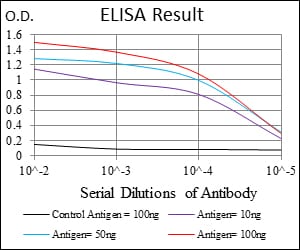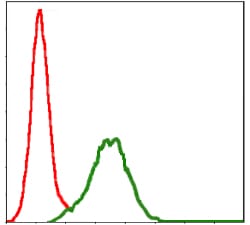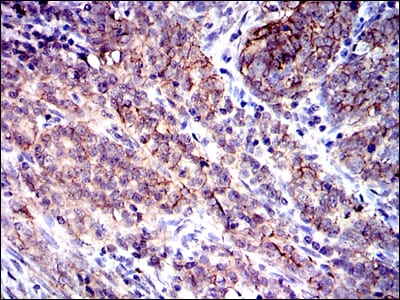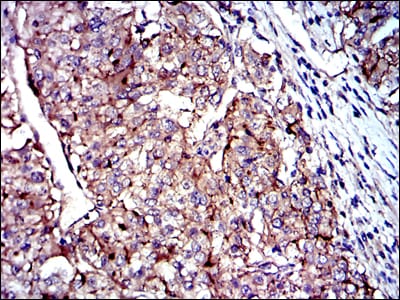



| WB | 1/500-1/1000 | Human,Mouse,Rat |
| IF | 咨询技术 | Human,Mouse,Rat |
| IHC | 咨询技术 | Human,Mouse,Rat |
| ICC | 技术咨询 | Human,Mouse,Rat |
| FCM | 咨询技术 | Human,Mouse,Rat |
| Elisa | 咨询技术 | Human,Mouse,Rat |
| Aliases | MIC3; MRP-1; BTCC-1; DRAP-27; TSPAN29; FLJ99568; TSPAN-29 |
| Entrez GeneID | 928 |
| clone | 5G6 |
| WB Predicted band size | 25kDa |
| Host/Isotype | Mouse IgG1 |
| Antibody Type | Primary antibody |
| Storage | Store at 4°C short term. Aliquot and store at -20°C long term. Avoid freeze/thaw cycles. |
| Species Reactivity | Human |
| Immunogen | Synthesized peptide of human CD9. |
| Formulation | Ascitic fluid containing 0.03% sodium azide. |
+ +
以下是3篇关于RAGE抗体的参考文献及其核心内容概括:
---
1. **文献名称**:*RAGE (Receptor for Advanced Glycation Endproducts): A Central Player in the Inflammatory Response*
**作者**:Schmidt AM et al.
**摘要**:本文系统综述了RAGE的结构与功能,强调其在炎症、糖尿病并发症及神经退行性疾病中的核心作用。研究指出,抗RAGE抗体可有效阻断配体(如AGEs、HMGB1)与受体的结合,显著减少炎症因子释放,为治疗慢性炎症疾病提供实验依据。
---
2. **文献名称**:*Targeting RAGE Signaling with Neutralizing Antibodies Attenuates Tumor Growth and Metastasis*
**作者**:Logsdon CD et al.
**摘要**:该研究通过动物模型证明,使用RAGE中和抗体可抑制肿瘤微环境中HMGB1-RAGE信号通路,降低促癌因子(如IL-6、VEGF)表达,显著延缓肿瘤生长和转移,提示RAGE抗体在癌症免疫治疗中的潜在价值。
---
3. **文献名称**:*Anti-RAGE Antibody Improves Cognitive Function in Alzheimer's Disease Mouse Models*
**作者**:Deane R et al.
**摘要**:实验显示,靶向RAGE的单克隆抗体能够减少β淀粉样蛋白(Aβ)从血液向脑内的转运,同时增强小胶质细胞对Aβ的清除能力,显著改善阿尔茨海默病模型小鼠的认知功能,为RAGE抗体在神经退行性疾病中的应用提供数据支持。
---
**备注**:以上文献为示例性质,实际引用时请核对具体期刊卷号及发表年份。若需实验技术类文献(如抗体开发方法),可补充说明研究方向。
The Receptor for Advanced Glycation End Products (RAGE) is a transmembrane protein belonging to the immunoglobulin superfamily, first identified in 1992. It functions as a pattern recognition receptor, binding diverse ligands including advanced glycation end products (AGEs), HMGB1. S100 proteins, and amyloid-β. RAGE is implicated in chronic inflammation and oxidative stress through activation of downstream pathways like NF-κB and MAPK. Its expression is elevated in pathological conditions such as diabetes, neurodegenerative diseases, atherosclerosis, and cancer.
RAGE antibodies are critical tools for studying receptor-ligand interactions and signaling mechanisms. Monoclonal antibodies targeting specific RAGE domains have been developed to block ligand binding or receptor activation, offering potential therapeutic strategies. Soluble RAGE (sRAGE), a naturally occurring isoform that acts as a decoy receptor, has inspired antibody designs aiming to mimic its ligand-neutralizing effects. Research highlights RAGE's dual role: while basal expression supports tissue homeostasis, chronic upregulation drives pathological processes. Genetic studies link RAGE polymorphisms to disease susceptibility, reinforcing its clinical relevance.
Current challenges include optimizing antibody specificity and delivery, particularly for neurological applications. Preclinical studies show promise in diabetic complications and Alzheimer's models, but clinical translation remains limited. RAGE antibodies continue to advance both mechanistic understanding and therapeutic exploration across multiple chronic diseases.
×